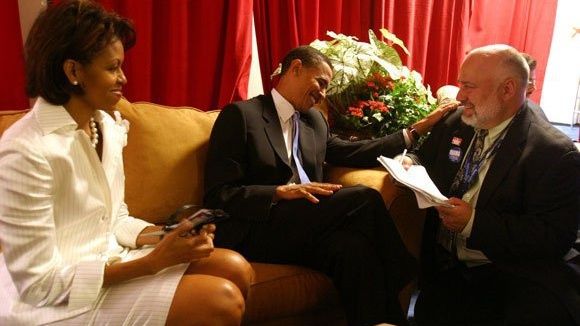Denna artikel är inaktuell eller lite äldre! Här hittar du vårt aktuella kursutbud.
Kevin Lampe: "The unasked question could become tomorrow’s challenge"

This week, Berghs was visited by Kevin Lampe, an internationally recognized expert in political media and communications strategies, with clients like Bill Clinton and Barack Obama on his résumé. Kevin Lampe hosted a seminar for Berghs all PR students.
“Ideas, Delivered” is the mission of Kevin Lampe’s firm Kurth Lampe. Kevin himself is regularly called upon to train his clients to work with the media. With professional experience including presidential campaigns, Kevin has worked during each presidential election cycle since 1988. He severed in variety of roles - most recently as Director of Communications - for presidential candidates and additionally served as an advance man for President Bill Clinton and Vice President Al Gore.
Yesterday, Kevin Lampe visited Berghs school of Communication to share with the PR students his great experience and knowledge.
Hello Kevin Lampe, can you describe what it is that you do?
We work on things that make a difference. We work internationally. A typical week we work in Chicago, South Africa and Sweden. The values of my firm are we want to change the world. It’s pretty simple. Our motto is ideas delivered. We take complicated things, package them up and make sure they are understandable to a targeted audience. We don’t do PR for soap, but if that soap cures cancer then we might. Before I got in to Public Relations and Public Affairs I worked in radio for a while and spent years as a stand up comedian.
Speaking of humor, is that an important factor of your work today?
It’s a key. First off, this business is incredible stressful. If you can keep it light sometimes when things are difficult it helps. But also it’s important to understand creativity. Often, as communicators, we tend to do things the same old way. And we need to change all the time. People laugh for different reasons. They laugh for emotional reasons, just like they vote for emotional reasons. The two are very much aligned. So I’m very lucky that humor is one of the tools I have got in my toolbox.
After having worked in Sweden, can you describe what it is like compared to in America?
When a Swede says they want to cooperate with you it means they want to do business. When an American says they want to cooperate they need a favor. There are different meaning to different expressions. For example, I’m typical American and the first held a seminar in Sweden my host said “we’re very satisfied” and I was devastated. To an American that means you did average. So I kept doing it and they kept saying they were satisfied and I grew more and more frustrated. I finally asked what they meant and they said they had had very high expectations and I met them. So “satisfied” to them meant “great” in my language. We have a cultural difference in how we communicate.
In short, what will you be sharing with our students today?
In 2004 a friend of mine and said he was giving a speech to the Democratic National Convention of Boston. I said, Barack (Obama), I would be glad to give you a hand with your speech. I literary walked on that stage with my state senator and walked off with the next president of the United States. It was a fascinating experience watching someone who is not a great public speaker very quickly become a great public speaker.
How did that happen?
First of all, his willingness to learn. He luckily had the gift of being a great writer so he had good content. And content is king. He wanted to learn so badly and was really good at taking advice from different people. He wanted everyone who was working with them to tell the truth. If you’re not honest with him, you won’t last very long.
I’ll tell this story to the students today. Also we’ll go through how a convention speech is different than a public speech. We are talking about political storytelling. And we’re going to talk about crying.
Digital technology is said to be causing shifts in the aspect of real-time engagement – what does this mean for PR practitioners?
Everything moves faster today but always goes back to content. Everybody needs to be good writers, you have got to be able to put a full thought and idea into everything you put out there because once it’s out there it is never going to go away. Also, maintain the content is important. Just because we post something on Twitter or create an event on Facebook, it doesn’t mean people are going to come. The idea still needs to be good.
If you were to give the becoming PR strategists one piece of advice that they will keep with them from today on, what would that be?
To always be creative and not be afraid to make mistakes. Also I think the key to success is to learn to say yes. It may not be the best paying client but you’ll learn a lot from it. Maybe you need to do PR for soap but then you can take the opportunity to learn something from it.
Another advice I’ll give is to always ask questions. There is no such thing as stupid questions, no question that should not be asked. If you think it’s stupid then it’s important because you obviously thought a lot about this. This “stupid” question may create a smart response, in fact the unasked question could become tomorrow’s challenge.
*****
The photo belongs to Kevin Lampe.